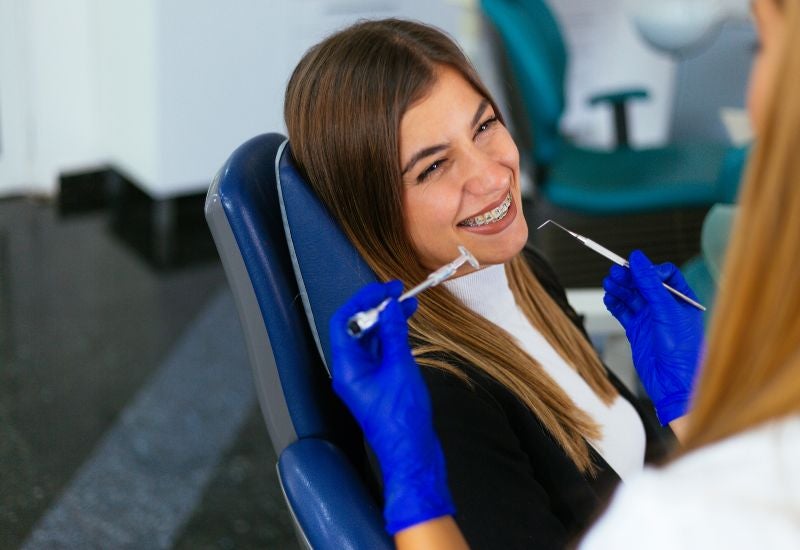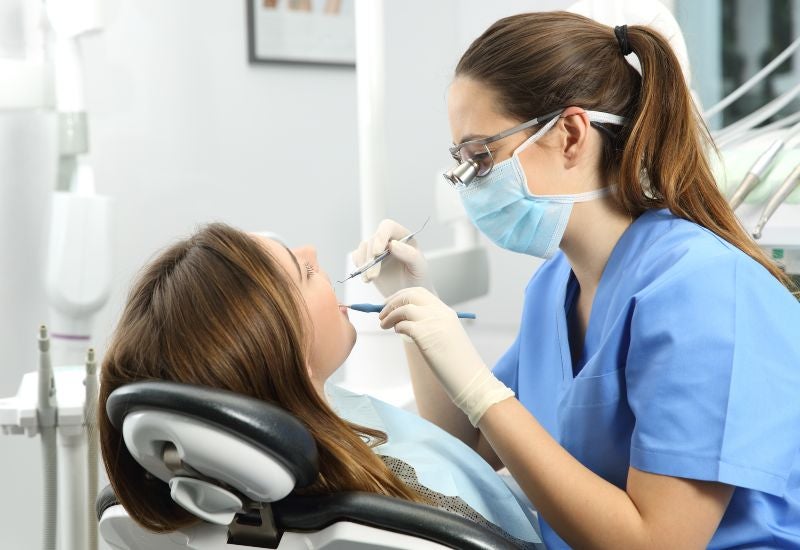-
Dental Hygiene Services for People with Braces: Special Considerations and Tips
Good oral hygiene (brushing at least twice a day and flossing at least once a day) is a must to keep both your mouth and your body healthy. When you have braces, the added brackets and wires add hiding places for plaque so you can’t only have good hygiene, you have to have great hygiene. Plaque is sticky because it is made up of food, saliva, and bacteria, so you need to brush after every meal. At night, you need to floss, rinse your mouth thoroughly, and then brush your teeth and braces until the metal shines.

Hygiene Issues Associated with Braces
If you don’t make good oral hygiene a priority when you have your braces, there are hygiene issues that can arise. Some of these issues are:
- Gingivitis: When plaque builds up around the gum line your gums might bleed, be swollen, and/ or puffy. These are all signs of gingivitis (gum disease) and it is the first stage of periodontal disease.
- Periodontitis: The next stage in periodontal disease is when the infection and inflammation in your gums spread to the ligaments and bones that support your teeth. This causes your gums to start to pull away allowing for plaque to continue to build up in the gaps and pockets that are formed when your gums pull away from the bone.
- Decalcification: These are permanent stains that form around your braces from decalcification. The only way to prevent these permanent stains is to brush routinely.
Good Hygiene with Braces
Now that you know what will happen if you don’t practice good hygiene, you might be more likely to follow these steps for good hygiene with your braces:
- Rinsing: This is more than taking a quick swig of water to get the extra toothpaste out of your mouth. When you have braces, brushing will be easier if you rinse your mouth first because it will loosen the food that is trapped in between your braces. Rinsing also protects the enamel of your teeth and fights off gingivitis.
- Brushing: You will still want to brush your teeth with a soft bristle or power toothbrush for two minutes every time you brush, but now you will want to brush every time after you eat. Brush all parts of your teeth, your tongue, the roof of your mouth, and add all parts of your braces. Remember to replace your toothbrush every three months or sooner if the bristles wear down because of repeated contact with your braces.
- Brushing Your Brackets and Braces: To brush your actual braces, an end-rounded bristle toothbrush works best to brush the brackets and wires. Brush them until they are shiny.
- Flossing: When you floss, continue to floss in all the areas that you would normally floss, but getting to these areas may be more difficult. Wax floss also makes flossing easier because it slides easier between your teeth and through your braces so there is less chance of it becoming hung up on the braces. People have found that using an orthodontic flosser or floss threader has helped them to get under the wires to below the gum line when they are flossing with braces.
- Rinse Again: When you have finished flossing, rinse with an antiseptic mouthwash to reduce biofilm and inflammation that can lead to gingivitis. There is an added plus of your mouth feeling and smelling fresh.
- Other Tools: There are also interdental brushes that are made to get in between the wires and brackets of your braces as well. Your orthodontist and/or dentist may also suggest using a fluoride rinse and an interdental cleaner as part of your oral hygiene routine.
Watch What You Eat
As you’ve seen, it is harder to keep your teeth clean while you have your braces. One way to make the cleaning process easier is to be careful of what you eat so as not to damage your gums and/or tooth enamel. Here are some foods to stay away from while you have your braces:
- Foods that are high in starch and sugar will lead to plaque buildup causing cavities, stains on your teeth, and/or gum disease,
- Highly acidic foods will erode the enamel on your teeth,
- Foods that are hard and crunchy can cause damage to the wires and brackets themselves,
- Sticky foods can pull metal brackets out of place.
Staying away from, or at least greatly limiting these foods will help you practice good hygiene while you have braces.
Additional Tips for Braces
There are several other activities that can help with keeping good oral hygiene while having your braces:
- Don’t chew on your fingernails, plastic straws, or pens because they can bend the wires on your braces.
- Cut your food with a fork and knife before biting into it.
- Wear a mouth guard that is designed for athletes with braces.
- Place dental wax on your braces where they rub against your mouth to prevent sores until you can get an appointment to see your orthodontist.
Practicing good oral hygiene requires only a few extra steps while wearing your braces. These additional steps will be worth the effort when you get your braces taken off and your teeth are healthy. If you live in the St. Charles area and have any questions, please contact us online or call us at 636.487.5652
-
The Benefits of Professional Dental Cleanings and How Often You Should Schedule Them
You brush twice a day. You’ve cut back on the sugary drinks and sticky candy. You even floss after you brush your teeth. Why do I need a professional to clean my teeth when I take care of them myself? We here at Donahue Dental want to share seven reasons why you should have a professional dental cleaning that we have learned about over our 33 years of serving people with their dental needs.

How Often Should You Undergo Professional Dental Cleaning
A professional dental cleaning consists of removing any dental plaque by scaling and planing your teeth. This is an essential process to your overall dental hygiene that should be done twice a year, or every six months. During your dental cleaning, it may be advised that you visit more regularly to have a professional clean your teeth until they are restored to health.
Benefits of Professional Dental Cleaning
If you are still wondering if you need a professional to clean your teeth when you do a perfectly fine job, here are seven reasons why you should have a professional clean your teeth:
Removal of Tartar and Plaque
The best home dental hygiene can’t remove all of the tartar and plaque from your teeth and gum line. A professional dental cleaning will remove tartar and plaque from above and below the gum line. They will also be able to remove all the bacteria and deposits that have settled in the gum pockets to prevent serious periodontal problems. The removal of tartar, plaque, and bacteria will help to prevent more serious dental conditions.
It brightens your smile
Your teeth become stained over time by the different food and drink that you consume. Even if you are careful not to consume food and drinks that will stain your teeth, they become discolored and need to be cleaned to remove these built-up stains. As part of the dental cleansing process, the dental professional will perfectly polish your teeth to provide you with your brightest smile yet. They may also recommend a prophylaxis treatment that can rid your teeth of these stains that have discolored your teeth.
Bad Breath is Reduced
Bad breath is more than “morning breath” or what your breath smells like after you have eaten something pungent. Bad breath is a medical condition called halitosis. One of the reasons your breath has an unpleasant odor is because of the bacteria, rotting food particles possibly below the gum line, and potentially gangrene that is a result of a gum infection. The frontline defense against bad breath is daily brushing and flossing, but a professional dental cleaning treats your entire mouth beyond what daily brushing brings which will leave your mouth healthier, fresher, and reduce infection in your mouth.
Cavities are Prevented
One of the reasons for tooth decay is plaque buildup on your teeth. Plaque eats away at the enamel of your teeth leaving them susceptible to cavities. Professional dental cleaning removes the plaque buildup on your teeth to keep the plaque from eating away the enamel of your teeth. A professional dental cleaning, added to your daily brushing and flossing, prevents cavities.
Tooth Loss is Prevented
Plaque not only eats away the enamel of your teeth, the plaque buildup also loosens your tooth and gum lines. As your tooth and gum line loosen your mouth becomes more susceptible to gum disease which is a leading cause of tooth loss. When a dental professional removes the plaque from your teeth, your tooth and gum line stay healthy and firm, preventing gum disease and tooth loss.
Early Detection of Dental Problems
Oral pain is usually intense and interrupts daily life. During your professional dental cleaning, the professional cleaning of your teeth will also check your teeth for tooth decay, cavities, fractured teeth, and lost or broken fillings. By discovering these problems early on, the hope is to fix the problems so they don’t become more serious, painful, and expensive over time.
More than Your Oral Health is Boosted
Your oral health is related to your overall health and there is a direct correlation between poor oral health and a diagnosis of diabetes and heart disease. During your professional dental cleaning, your dentist may also be able to diagnose other medical conditions during your exam.
If you live in, or around, St. Charles and need a dentist or have questions about your oral health, please don’t hesitate to reach out to us at Donahue Dental. You can find us online or call us at 636.487.5652.
